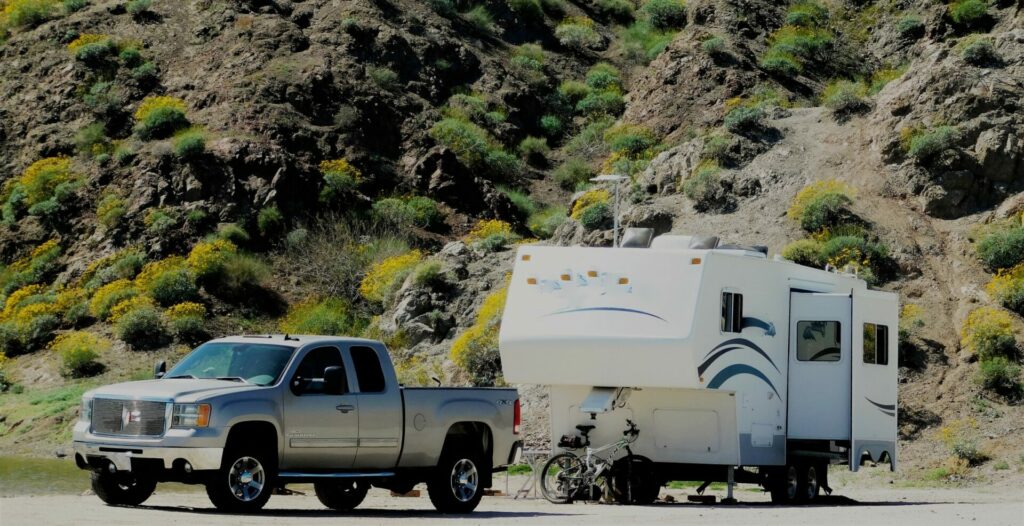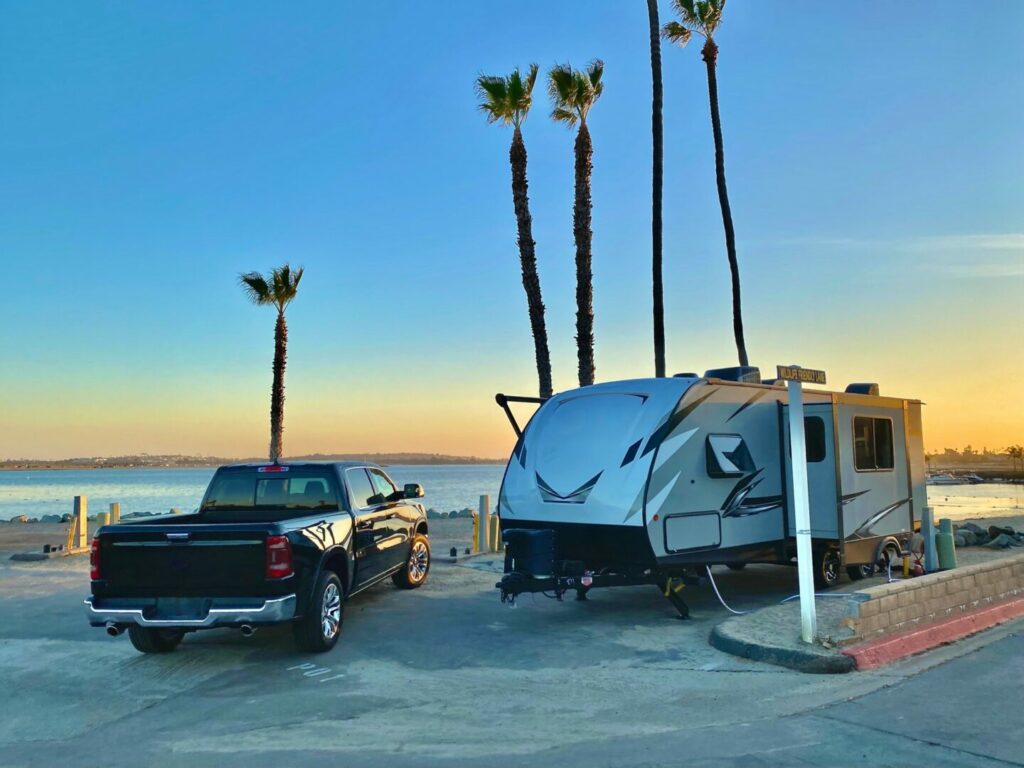Table of Contents Show
When new RVers look at campers, they usually have one question in mind: How much can my truck tow? Towing capacity is crucial to the overall safety of traveling with an RV.
For example, there’s no point in buying a new toy hauler that weighs 16,000 pounds if you have a Chevrolet Silverado. That truck won’t have the capability of towing something that heavy.
Let’s look at why towing capacity matters and why you should pay attention to the GVWR of campers when you’re on the lot.
Your truck and trailer have to work well together. Otherwise, your weekend camping trip could end in disaster. Let’s dive in!
How Much Can My Truck Tow?
Every truck, even ones with the same make, model, and year will have different towing capacities. Vital factors include cab length, truck bed measurements, engine size, and more.
Generally, the higher the model number, the more the truck can tow. A Ford F-150 won’t tow as much as a Ford F-250 or Ford F-350.
But you’ll have to find out the towing capacity of your particular vehicle by doing a little research. Let’s review how to do that.
How Do I Find Out the Towing Capacity of My Truck?
The owner’s manual should have the towing capacity of your specific truck. Because your neighbor has a similar truck doesn’t mean both have the same towing capacity. Always double-check the owner’s manual.
However, sometimes even the owner’s manual doesn’t have this information because as the specifics of each truck change, towing capacity also changes.
Truck manufacturers have lists on their websites that give year, make, model, cab size, truck bed size, etc., to help owners identify their truck and its towing capacity.
You can also find out the towing capacity by looking up the VIN. Ram has a VIN lookup page to help owners find the details of their model.
In addition, some trucks have a sticker on the driver’s door with the towing capacity and other essential numbers.
Pro Tip: If you haven’t towed your RV before, then you need this RV Towing Guide for Newbies in your life!

How Do I Find Out the Payload Capacity of My Truck?
You can find the payload capacity the same way you learn your truck’s towing capacity. Looking in your owner’s manual, checking the driver’s door sticker, looking up your truck’s information on the manufacturer’s website, and doing a VIN lookup can lead you to the payload capacity.
This number also varies by the specifics of each truck, so it’s necessary to find your truck’s specs and not only rely on overall numbers.
Manufacturers love advertising that their trucks have the highest this or most impressive that, but those numbers aren’t accurate for every model.
Is GVWR the Same as Towing Capacity?
GVWR (gross vehicle weight rating) is the maximum weight of a vehicle. This has nothing to do with towing capacity.
Each truck has a unique GVWR, which means how much cargo it can safely hold. If you weighed your truck on a CAT scale, you would want the overall weight to be under the GVWR.
Towing capacity only comes into the picture when deciding if your truck can safely tow a camper. The towing capacity of your vehicle should be over the GVWR of your trailer.
Every camper has a sticker, usually on the driver’s side or inside the entry door, including the cargo-carrying capacity and GVWR. These numbers indicate the max you can load on that camper.
If the GVWR of your camper is 12,000 pounds, then your truck’s towing capacity should be over 12,000 pounds. Most RVers follow the 80/20 rule, where the trailer’s weight is about 80% of the truck’s towing capacity.
This gives you wiggle room should you make an error. It also doesn’t put too much strain on the truck’s brakes, transmission, and engine.
Pro Tip: If you want to learn more about how GVWR is calculated and other important terms, click the link!

What Happens When You Tow Over Capacity?
The manufacturer determines towing capacity. If you ignore this number and end up in an accident, you could void your warranty. Insurance may not pay any claims either. There are reasons for limits on vehicles.
In addition, any time you tow over capacity, you run the risk of damaging your truck. The brakes, transmission, and engine all have max capacities.
If you put too much strain on any of these systems, they can fail. The repairs can be costly, and in some cases, the damage is irreparable.
For example, it will take longer to slow down if your brakes can’t handle the towing load. Swaying can also occur if your truck can’t handle the load.
Tire failure is more common because you’re exceeding the load rating. Furthermore, your engine can overheat, causing damage to your transmission. Your front tires can lose traction if they lift off the ground even the slightest bit.
The list of what could happen is endless, so it’s best to ensure your truck can handle what you want to tow.
Pro Tip: Looking for a new truck for towing? These are hands down The Best Trucks For towing!

How Do You Know If You’re Towing Too Much?
Weighing on a CAT scale is one of the best ways to know if you’re towing too much. Take your truck and camper to the nearest truck stop with a CAT scale and weigh them together. Then drop your trailer and return to the scale to weigh the truck.
When you subtract the truck’s weight from the combined weight, you’ll know the camper’s weight. If this number is safely under the GVWR of the trailer and the towing capacity of the truck, you’re in good shape.
Remember, you want to aim for no more than 80% of the truck’s towing capacity.
What Is an Acceptable Trailer Tongue Weight?
In addition to the towing capacity of your truck and the GVWR of your camper, you also want to know the tongue weight of your trailer.
Typically, this number is 10-15% of the overall weight of the camper. So if you’re towing a 10,000-pound camper, the tongue weight is usually around 100-150 pounds.
The tongue places weight on the rear bumper of your truck and the hitch. Ensure your hitch has a load rating above the trailer tongue weight.
The tongue weight is different from towing capacity. While the towing capacity refers to the weight you can pull, the tongue weight refers to the weight you place on the truck’s rear.
For RVers who own fifth wheels, this number is crucial. Many 0.25-ton trucks don’t have the payload capacity to tow the tongue weight of a fifth wheel. In most cases, the weight you place on the truck’s bed is too great for those trucks to transport fifth wheels safely.
The tongue weight of the fifth wheels is about 20% of the overall trailer’s weight. Therefore, if you have a 14,000-pound fifth wheel, the tongue weight will be around 2,800 pounds.
This is why most RVers own 0.75-ton to one-ton trucks and often have dually trucks when towing heavier fifth-wheel campers. The payload capacity is much higher.
Know How Much Your Truck Can Tow Before You Go
These numbers aren’t only to protect the manufacturer. They’re critical to the safety of towing RVs. You’re not only endangering your life and the lives of your passengers, but you’re also endangering everyone else driving on the road with you if you ignore these numbers.
Drive safely and stay under your truck’s towing capacity. Weigh your truck and camper at a CAT scale. Then you can drive confidently, knowing you’ve done your job as a responsible driver to protect the life of your truck and its systems.
Do you know the towing capacity of your truck?






